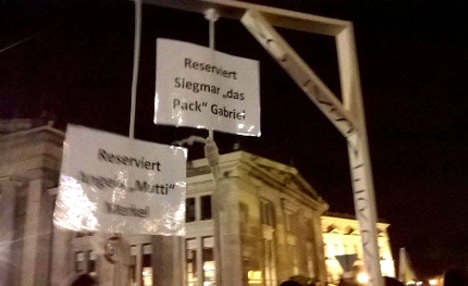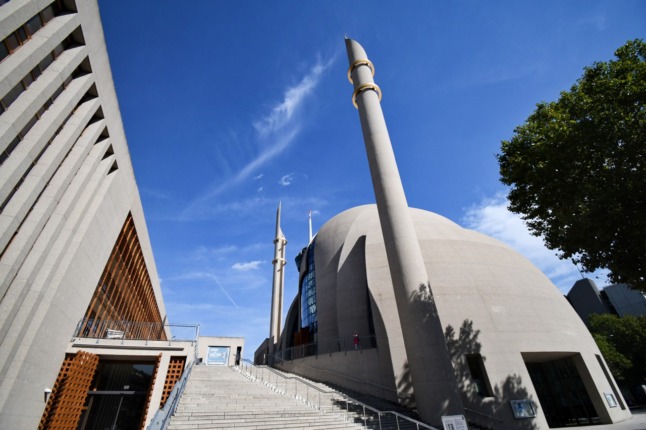Dresden prosecutors announced on Tuesday that they are investigating an unknown Pegida demonstrator for carrying a fake gallows at the anti-Islamic group's weekly Monday demo. The punishment could stretch up to five years in jail, reports Die Zeit.
From the fake execution device hung two signs. One said the spot was 'reserved' for Chancellor Angela Merkel, the other for her deputy Sigmar Gabriel – but with the Social Democratic Party (SPD) leader's first name spelled “Siegmar“.
This is the second case prosecutors have started against the group in recent weeks, after opening an investigation into Pegida leader Lutz Bachmann over hate speech.
Bachmann had called foreigners “livestock“ and “scum“ in a Facebook post, prosecutors allege.
While Bachmann's comments are clearly reprehensible – and the gallows might strike some as worrying – both investigations have been taken by Pegida as proof that they are unfairly singled out by the German establishment – and not without reason.
As several people have pointed out, a guillotine with Gabriel's name on it (this time at least spelled correctly) made an appearance at Saturday's anti-TTIP demo in Berlin.
By the Way: Sich zurecht über den #Pegida #Galgen empören und bei #Stoppttip wegsehen ist allerdings inkonsequent. pic.twitter.com/K5n9LErZDS
— Fabian (@de_Tocqueville) October 13, 2015
The march was attended by upwards of 100,000 people who formed a wide spectrum from communists, to Berlin scenesters, to families enjoying a day out.
There was not a peep about the macabre symbol the next day. While #Galgen (gallows) was trending throughout Tuesday in reference to Pegida, there was not a ripple after the TTIP demo.
And here's the difference.
Jörn Alexander a spokesperson for the TTIP demo organizers told Tagesspiegel “it was only one symbol from hundreds of thousands“ at the march, adding that one should see the whole picture and not stereotype a movement through one placard.
Not an unreasonable point.
But does Pegida get the same treatment? Hardly.
Opportunistic politicians have jumped on the outcry to insinuate the wooden gallows gave away the secret violent intentions of the whole movement.
SPD deputy leader Manuela Schwesig denounced the whole demo on account of the one symbol, complaining on Twitter “so that's the concerned citizens of Pegida.”
Das geht gar nicht!!! Das sind also die “Besorgten Bürger” von #Pegida #Dresden?! https://t.co/RXCS63YGd7
— Manuela Schwesig (@ManuelaSchwesig) October 12, 2015
Worse still, a leader of Merkel's Christian Democratic Union (CDU) mocked the misspelling of Sigmar, saying that “when someone is too stupid to to spell Sigmar Gabriel right, then he is disqualified [from joining in democratic discourse.]“
A clear and unavoidable truth of the debate on Pegida and xenophobia in Germany is the fact that it is coming from poor, sidelined parts of the country.
Calling the people who look to Pegida to answer why they have been left out by Germany's economic success story “stupid“ not only isn't helpful – it demonstrates a total detachment from the inequalities which feeds racism in much of eastern Germany.
The truth is that police reported on Tuesday that the march passed off peacefully, and one must recognize that – whatever one thinks of Pegida – up until now they have been a largely peaceful movement.
The case against Bachmann for racial hatred could also prove complicated. His alleged comments do not directly incite violence and it remains to be seen whether he will be taken to court.
Pegida's leadership feeds off a sense of injustice – its central message to followers is not to believe the 'lying media.' This is a method of control that says 'we are the only ones you can trust.'
It would be wiser not to fall into this trap. As stupid a symbol as a gallows is, one must recognize that Pegida also has shades – and they're not all Nazi brown.



 Please whitelist us to continue reading.
Please whitelist us to continue reading.